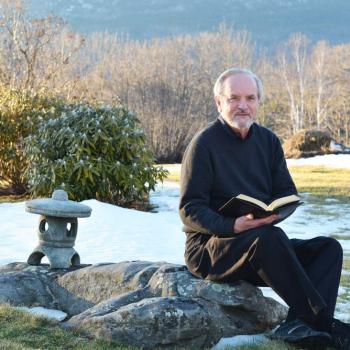
In a few weeks I will be writing about the brand new book from Thomas Moore, a modern-day translation of one of the New Testament gospels, The Book of Matthew. But as I did a little research on that book, I was reminded of Moore’s previous release, the groundbreaking A Religion of One’s Own.
If you are one of the many who consider themselves “spiritual but not religious”, this book is a must-read as it lays out a blueprint by which you can develop your own spiritual practice. This is important because if you are truly serious about your spirituality, a regular routine can enrich your spiritual awareness and strengthen your faith. This practice doesn’t just replace religion, it becomes your religion and an integral part of your life.
Moore has written that he sees the world “heading for a completely secular approach to life, which is to say soulless, which is to say disaster. We need a new way to be religious, a really new way. A way that honors the traditions of the past but moves on.” And A Religion of One’s Own shows us the way, offering us guidance in building our own spiritual practice while sparking our imagination as to what being spiritual really means.
What follows is a summary of the main tenets found in A Religion of One’s Own, a 10-point list written by Thomas Moore himself. It lays out the keys to developing your own spiritual practice and offers a glimpse of what a “spiritual but not religious” life can be.
- Meditate. Learn a formal way of meditating, or be contemplative in nature, alone, at work, or at home.
- Live ethically. Do no harm and make your life a positive contribution to humanity. Work ethically for ethical companies or organizations. Change work if necessary. At least, stay on track toward a highly moral life work.
- Live responsively. Read the signs for who you are to be and what you are to do.
- Have a dream practice. Dreams give you strong hints about what’s going on and how you can adjust. Without them you have no guidance but your own consciousness, which is too limited.
- Be a mystic. Expand your sense of self through art and wonder. Achieve special states of awareness. Have a greater sense of self through losing yourself.
- Be intimate with nature. Especially take daily note of the sky: sun and moon, clouds, weather, planets, stars. Learn from animals. Be astonished by geology and plant life.
- Be a monk or monkess. Adapt monasticism of any variety to your daily life and to the world in which you live. Spend time carefully. Read deeply. Study. Honor the book, good food and community.
- Aim for bliss. Not superficial happiness or possessions or wealth. Not entertainment. But bliss: knowing you are in the right place and doing what you are meant to do.
- Develop a philosophy and theology of life. Think about your life. Work out some principles for yourself. Don’t follow the crowd. Take the road less taken, the narrow gate, the path you see behind you.
- Learn from the world’s religions and spiritual traditions. You don’t have to join or believe. Find insights and methods and beautiful expressions and images. Don’t separate secular from sacred. Make your own collection of truths and art works.
I am thrilled to learn that Thomas Moore will soon be writing a column here at Patheos titled Soul & Spirit. Look for it soon.
Want “Wake Up Call” delivered to your inbox? Subscribe by e-mail in the right hand column, just under the first ad, to receive a new story each week.
















